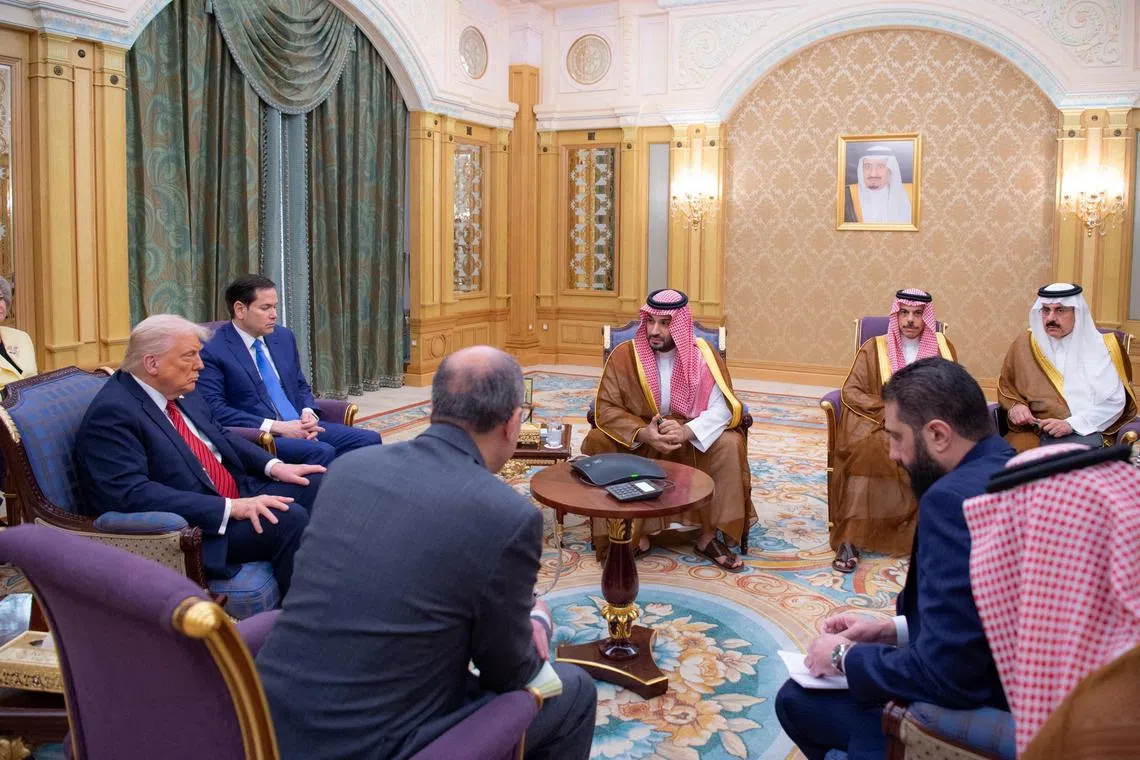Trump’s big Syria announcement surprised his own sanctions officials
Sign up now: Get ST's newsletters delivered to your inbox

Before US President Donald Trump’s trip to Saudi Arabia, there was no clear indication that he had made a decision to lift all sanctions on Syria, a senior US official said.
PHOTO: REUTERS
NEW YORK/WASHINGTON – When US President Donald Trump announced in Saudi Arabia on May 13 that he would lift all sanctions on Syria, the decision – which will boost a country devastated by 13 years of war – took many in the region by surprise.
It also caught some in his own administration off guard.
In Washington, senior officials at the State Department and Treasury Department scrambled to understand how to cancel the sanctions, many of which have been in place for decades, according to four US officials familiar with the matter.
The White House had issued no memorandum or directive to state or Treasury sanctions officials to prepare for the unwinding and did not alert them that the President’s announcement was imminent, one senior US official told Reuters.
The sudden removal of the sanctions appeared to be a classic Trump move – a sudden decision, a dramatic announcement and a shock not just for allies but also some of the very officials who implement the policy change.
After the announcement, officials were confused about exactly how the administration would unwind the layers of sanctions, which ones were being eased and when the White House wanted to begin the process.
By the time Mr Trump met interim Syrian President Ahmed al-Sharaa in Saudi Arabia on May 14, state and Treasury officials were still unsure how to proceed, the senior official said.
“Everyone is trying to figure out how to implement it,” said one US official in reference to Mr Trump’s announcement.
Following the ouster of former president Bashar al-Assad in late 2024, US officials had drafted memos and options papers to help guide the government on lifting Syria sanctions if and when the administration chose to do so.
But senior White House and national security officials, as well as some lawmakers on Capitol Hill, have for months debated whether to ease sanctions, given Mr Sharaa’s former ties with Al-Qaeda. The Syrian leader severed ties with the group in 2016.
Before Mr Trump’s trip to Saudi Arabia, there was no clear indication – at least to the US officials working on sanctions – that the President had made a decision, the senior US official said.
The State Department and Treasury Department did not immediately respond to a request for comment.
A White House official told Reuters that Turkey and Saudi Arabia had asked Mr Trump to lift the sanctions and to meet Mr Sharaa. In his announcement, Mr Trump said that he did so to give Syria a chance at a better future.
Complicated unwinding
The easing of sanctions on Syria does not appear to be imminent.
A White House read-out of Mr Trump’s meeting with the Syrian leader said the US President asked Syria to adhere to several conditions in exchange for sanctions relief, including telling all foreign terrorists to leave Syria, deporting “Palestinian terrorists” and helping the US prevent the resurgence of militant group ISIS.
Removing sanctions is rarely straightforward, often requiring close coordination between multiple different agencies and Congress.
But it is particularly challenging in Syria’s case, given the layers of measures cutting it off from the international banking system and barring many international imports.
The US first put the country on its list of state sponsors of terror in 1979 and since then has added additional sets of sanctions, including several rounds following the country’s 2011 uprising against Mr Assad.
Mr Edward Fishman, a former US official and the author of the book Chokepoints, said the unwinding of Syria sanctions, which were imposed under a mix of executive orders and statutes, could take months to ease.
He noted, however, that the Treasury Department has practice from sanctions relief provided to Iran as part of the nuclear deal in 2015.
Complicating the task are sanctions imposed under the Caesar Syria Civilian Protection Act, also known as the Caesar Act, which was passed in 2019 and extended in late 2024 just after Syria’s government fell. The Act imposed not just stiff sanctions on Mr Assad’s government, but also secondary sanctions on outside companies or governments that worked with it.
Overturning the Bill would require congressional action, but it includes a provision allowing the President to suspend the sanctions for national security reasons. Mr Trump could also issue a general licence suspending some or all of the sanctions.
Mr Fishman said he would be surprised if every single sanction was lifted as part of Mr Trump’s order, adding that some specific people or entities in Syria sanctioned for specific behaviour-based reasons, such as support for a terrorist group, may not be removed from the sanctions list. REUTERS


